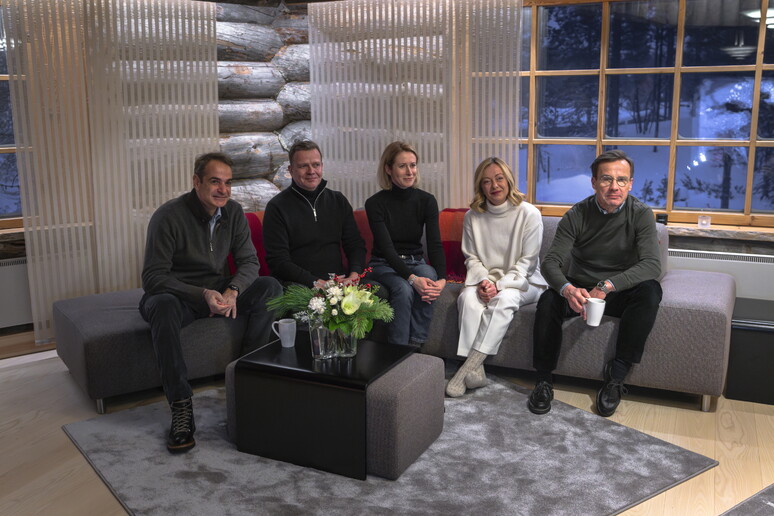Premier Giorgia Meloni on Sunday
highlighted the commitment to defend external borders and said
Russia or criminal organizations would not be allowed to
undermine security, speaking at the end of the North-South
Summit on European security and defence in Saariselkä, in the
Finnish region of Lapland.
"We want to defend external borders and we don't want to allow
Russia or criminal organizations to undermine our security",
said Meloni.
The gathering was hosted by Finnish Prime Minister Petteri Orpo
and attended, in addition to Meloni, by EU High Representative
for Foreign Affairs Kaja Kallas, Greek Prime Minister Kyriákos
Mitsotakis and Swedish Prime Minister Ulf Kristersson.
Meloni went on to say that the EU is dealing with "great
challenges".
"Our countries have often been considered and have found
themselves on opposite sides within the EU, with the North and
the so-called frugal on one side and the nations of the South
accused of being spendthrifts, something I believe is a
prejudice, on the other.
"These nations are now here to talk about the theme of security,
and this shows that we have understood that the world has
changed and we can't deal with challenges if we don't understand
the point of view and problems of others", she noted.
On Albania and new Italian processing centres for asylum seekers
Italy has built in the country as part of an agreement between
Rome and Tirana, Meloni said she has "summoned for tomorrow a
meeting on the theme of Albania to understand how to proceed",
answering to a reporter's question.
Italian judges have so far not validated the detention of two
groups of asylum seekers taken to Albania, referring their cases
to the European Court of Justice - which had earlier established
that an applicant could not go through a fast-track procedure
that could lead to their repatriation if their country of
provenance was not deemed wholly safe - even after the cabinet
in late October issued a decree listing 19 safe countries for
repatriation.
The European Court of Justice is set to rule on the referrals in
January.
Speaking about a ruling of the Cassation Court in December that
said courts could not disregard the decree, Meloni said "it
looks to me like the Cassation ruled in favour of the
government, it is the right of governments to establish which
countries are safe" while judges can rule on a "single case, not
disapply the totality" of the measure.
Meloni also spoke about Deputy Premier and Transport Minister
Matteo Salvini's acquittal in the Open Arms case in which he was
accused of abducting and failing to perform public acts when he
refused to allow the disembarkation of 147 migrants from an
NGO-run vessel in August 2019, when he was interior minister, as
part of a controversial closed-ports policy.
A court of first instance in Palermo on Friday night ruled that
there was no case to answer.
"It looks to me like at the centre of the trial against Salvini
were his political choices rather than actual crimes and that
the jurisdiction was used to influence politics", she said.
However, "today both I and Salvini are happy of the excellent
work being done by the minister of interior", of infrastructure
and of transport, Meloni noted, replying to a question on the
possibility that Salvini could return to the interior ministry.
The premier went on to say that "a lot is being said about what
will happen" when President-elect Donald Trump takes office.
"I think that we shouldn't follow rumours about Trump: I heard,
for example, the last thing he said on Ukraine, 'we are working
for peace but we can't have peace by abandoning Ukraine', which
is approximately what I have said for years.
"I would wait to understand exactly what is the will of the new
president of the United States", Meloni said, in reply to a
reporter asking her to comment on Trump's request to raise the
contribution of NATO countries to 5% of GDP.
ALL RIGHTS RESERVED © Copyright ANSA











